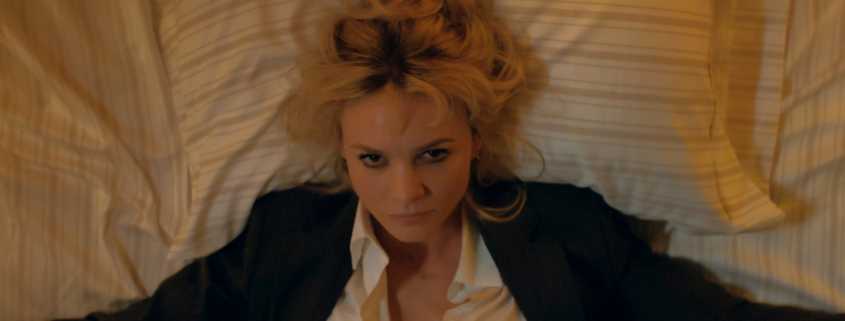REVIEW: ‘Promising Young Woman’ is unapologetically itself

“Promising Young Woman” is a masterpiece. While it may be unsettling to some, it is an all too real and recognizable world to me. Straight men are the scum of the earth, and writer and director Emerald Fennell does not shy away from this narrative.
Fennell, best known for her portrayal of Camilla in “The Crown” and for her time as showrunner on “Killing Eve” season two, directs her bombshell script.
Cassie, our leading lady, played by Carey Mulligan, is a grief-stricken medical school dropout with a taste for revenge.
“Every week I go to a club, and every week I act like I’m too drunk to stand,” Cassie said. “Every week, a nice guy comes over to see if I’m OK.”
When they finally get to an intimate setting, she drops her act, shocking the men. The premise unveils in the trailer; however, beware of spoilers below.
Cassie is the ultimate femme fatale. She may dress as a cotton-candy-cherry-on-top-girly-pop, but she is more than meets the eye. Fennell told The Hollywood Reporter that Cassie’s style was a coping mechanism; to blend in, she expresses hyperfunction.
The film is a masterclass of writing utilizing show versus tell. The lack of expositional storytelling makes for a more compelling watch.
While in college, Cassie’s best friend Nina was raped. Her rapist, Al Monroe, went unpunished, and the trauma resulted in Nina taking her life.
After dropping out of medical school, Cassie begins working at a coffee shop where she meets Ryan, a charming pediatrician portrayed by Bo Burnham. He recognizes Cassie from college and asks her out.
On their first date, he tells Cassie he is still in touch with a few people from their time in school. When she returns from the date, she looks up the names he mentioned and plans her revenge for Nina.
First, she calls up Madison, a former classmate, who disbelieved Nina’s assault. Cassie is disappointed but not surprised to see Madison still dismisses Nina’s attack.
Additionally, she targets the defense attorney who defended Al in court. When she finds him, the situation plays out differently than expected. Heapologizes, sobbing into Cassie’s lap and she forgives him.
Choosing to abandon her plan, Cassie falls in love with Ryan and can disentangle herself from her trauma to love again. Even though on-screen their relationship is sunshine, singing along to Paris Hilton and gumdrops, I knew it was a facade in the pit of my stomach.
Alas, Madison shows up at her house to tell Cassie she remembered a video of Nina’s rape exists on her old phone. She begs her not to watch it, but Cassie doesn’t listen. Mulligan’s nuanced performance in this moment of reliving trauma, anger and pain is Oscar-worthy.
The video reveals Ryan’s presence at Nina’s attack. Cassie shows Ryan the video and promises to release the video if he doesn’t give her the address to Al’s bachelor party.
When Cassie calls Ryan out, he transforms from a sweet guy to a blubbering, whiny toddler. Fennell reminds us that, subtly, men may seem kind, but toxic masculinity always prevails on the surface level.
Cassie arrives at the party dressed as a “sexy nurse” and forces all the men to drink. As they all cheer her on, she tells Al she doesn’t get paid unless they go upstairs alone.
Though the movie deals with heavy-handed content, there is never explicitly graphic imagery. During the bachelor party, one notable moment of directing is when Cassie cascades vodka into the men’s mouths. Close-ups on lips, teeth and messy mustaches flashed on the screen. I saw men as grotesque dogs, guzzling vodka — the camerawork permitted animalistic depictions, a nod to Fennell’s eye for directing.
Once they are alone, Al asks for her name, and Cassie says, “Nina Fisher.” Al freezes.
“It’s every guy’s worst fear getting accused like that,” Al said, whining.
“Can you guess what every woman’s worst fear is?” Cassie said in return.
She tells him she will leave him with a permanent reminder of Nina and grabs a knife, but Al manages to slip a hand free. In a brutal scene, Al suffocates Cassie using all of his force until she falls limp. Cassie remains splayed, arms in a T, with a pillow covering her face.
The imagery alludes to Cassie as a Christ figure, and in some ways, she is. She sacrifices herself for Nina.
At Al’s wedding, Ryan receives a scheduled message from Cassie. The roman numeral five displays on the screen and police sirens ring. My heart began racing.
“You didn’t think this was the end?” Cassie said.
The film ends successfully, maintaining its tone. “Promising Young Woman” is a gripping, delicious watch. From start to finish, Fennell’s writing remains impeccable. The plot is tight, and every act is thrilling. The ending is satisfying.
Casting also played a role in Fennell’s vision. The casting of lovable, recognizable men comedians, such as Burnham or Sam Richardson, as Cassie’s predators allowed the movie to pierce harder.
Every choice is intentional. Every detail is essential; Fennell’s stylistic choices create an artistic masterpiece of womanhood.
Even the music played a large role in my captivation. It is hard not to have a pessimistic view of straight men after the film, but Fennell’s brutal script is reality. Rape cases go unbelieved, are swept under the rug and those accused go on to be doctors, lawyers and “upstanding” members of society.
The tragedy of the film stems from realism. My wish for “Promising Young Woman” is just to make men think twice. Being a bystander is complacency.

